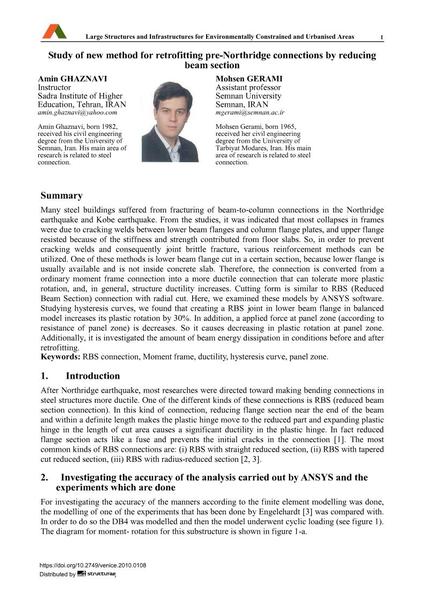Study of new method for retrofitting pre-Northridge connections by reducing beam section

|
|
|||||||||||
Bibliografische Angaben
| Autor(en): |
Amin Ghaznavi
Mohsen Gerami |
||||
|---|---|---|---|---|---|
| Medium: | Tagungsbeitrag | ||||
| Sprache(n): | Englisch | ||||
| Tagung: | IABSE Symposium: Large Structures and Infrastructures for Environmentally Constrained and Urbanised Areas, Venice, Italy, 22-24 September 2010 | ||||
| Veröffentlicht in: | IABSE Symposium Venice 2010 | ||||
|
|||||
| Seite(n): | 108-109 | ||||
| Anzahl der Seiten (im PDF): | 8 | ||||
| Jahr: | 2010 | ||||
| DOI: | 10.2749/venice.2010.0108 | ||||
| Abstrakt: |
Many steel buildings suffered from fracturing of beam-to-column connections in the Northridge earthquake and Kobe earthquake. From the studies, it was indicated that most collapses in frames were due to cracking welds between lower beam flanges and column flange plates, and upper flange resisted because of the stiffness and strength contributed from floor slabs. So, in order to prevent cracking welds and consequently joint brittle fracture, various reinforcement methods can be utilized. One of these methods is lower beam flange cut in a certain section, because lower flange is usually available and is not inside concrete slab. Therefore, the connection is converted from a ordinary moment frame connection into a more ductile connection that can tolerate more plastic rotation, and, in general, structure ductility increases. Cutting form is similar to RBS (Reduced Beam Section) connection with radial cut. Here, we examined these models by ANSYS software. Studying hysteresis curves, we found that creating a RBS joint in lower beam flange in balanced model increases its plastic rotation by 30%. In addition, a applied force at panel zone (according to resistance of panel zone) is decreases. So it causes decreasing in plastic rotation at panel zone. Additionally, it is investigated the amount of beam energy dissipation in conditions before and after retrofitting. |
||||
| Stichwörter: |
Duktilität
|
||||
